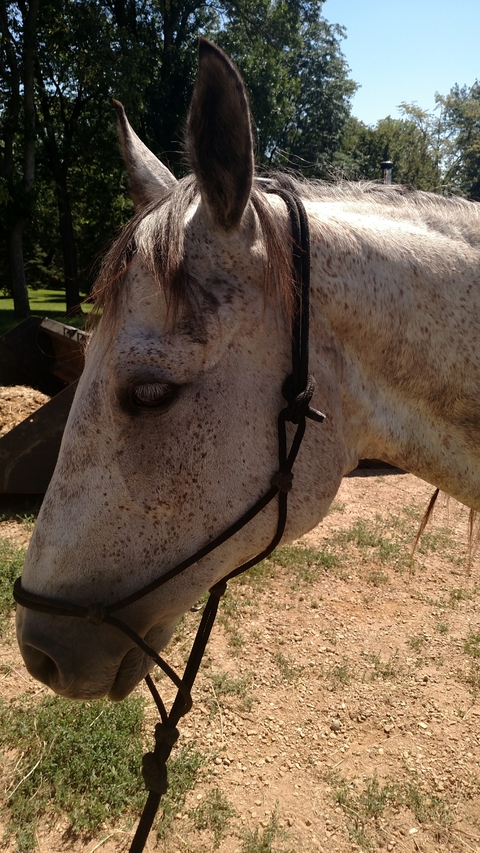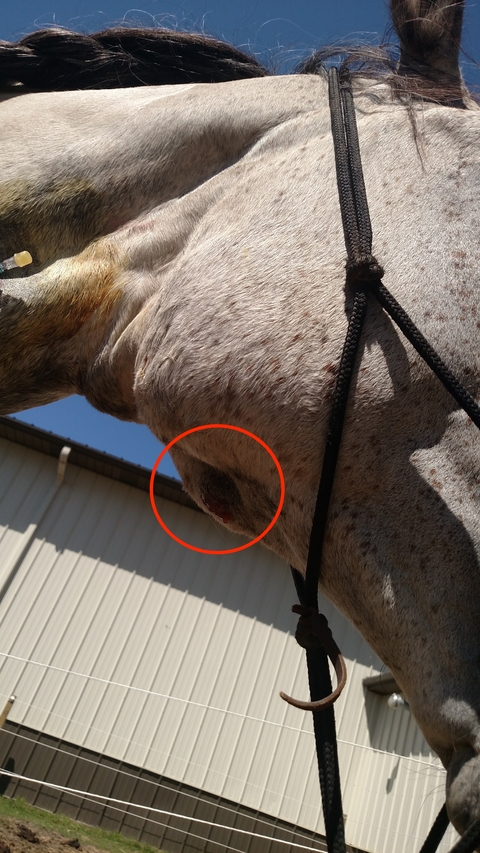Quick facts
-
Strangles is a highly contagious infection that causes fever, nasal discharge and abscesses near swollen lymph nodes.
-
Hot packs can help the abscesses mature before opening and flushing them out.
-
Horses that struggle to breathe may need antibiotics or hospital care.
-
To prevent disease spread, isolate sick horses and refrain from sharing equipment between healthy and sick horses. Change your clothes and wash your hands before working with healthy horses.
-
Vaccines can help lessen the severity of strangles symptoms but can’t completely prevent the disease.
What is strangles?
Strangles is a highly contagious bacterial infection of the upper airway in horses. Strangles can cause the lymph nodes to block the upper airway. Veterinarians can diagnose strangles by taking a swab.
Signs of illness
Early signs
-
Fever, temperature above 102 F
-
Depression
-
Nasal discharge which starts clear and becomes thick and yellow
A few days after onset, the horse will develop painful swelling of the lymph nodes. This swelling produces abscesses that will rupture and discharge pus.
More serious cases arise when horses have lymph node swelling in the throatlatch area. These horses often refuse to eat due to pain. They may stand with their head and nose stretched out to help them breathe. Horses that are struggling to breathe need veterinary care right away.
Some horses carry strangles but don’t show symptoms. This is likely the most important cause of recurring infection on some farms. Veterinarians take several swabs to identify horses that carry strangles.
Treatment
Veterinarians usually recommend applying hot packs to the lower jaw. This will help the abscesses mature so they can be safely opened. Once opened, flush the inside of the abscess with dilute povidone-iodine solutions until they heal. Horses usually recover fully after the abscesses open.
Many veterinarians refrain from using antibiotics for uncomplicated cases. Antibiotics can delay the abscesses from maturing.
Horses that have trouble breathing need a more aggressive treatment. They’ll likely need anti-inflammatories and antibiotics. The horse may need hospital care to keep their airway open and keep them hydrated.
Preventing disease spread
How strangles spreads
-
Horse-to-horse contact
-
Contact with contaminated people, tack, drinking troughs, etc.
What to do if strangles occurs
-
Isolate all the horses with symptoms to one area.
-
Use separate tools and grooming equipment in the isolation area.
-
Completely clean all feed, manure and bedding from contaminated areas. Keep these materials away from healthy horses.
-
Thoroughly disinfect equipment, stables, fences, trailers, etc.
-
Use a phenolic disinfectant.
-
-
Change your clothes and wash your hands before coming in contact with healthy horses.
Ideally, isolate new horses for two to three weeks. Check their temperatures regularly and watch for any signs of strangles. If signs occur, have a veterinarian take a swab for strangles.
Vaccines
Horses that haven’t been exposed to the bacteria in recent years are more prone to strangles. Intramuscular and intranasal vaccines are available for horses. These vaccines decrease the severity of strangles symptoms but don’t completely prevent the disease.
Reviewed in 2021



